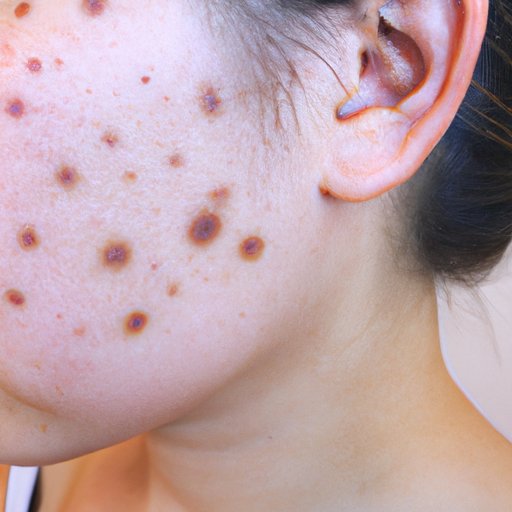Introduction
White spots on the skin are a common problem that can have many different causes. Though sometimes harmless, they can also be a sign of a more serious underlying condition. Understanding the types of white spots, common causes, and available treatments is important for anyone who notices these spots on their skin.
What Are Those Mysterious White Spots On Your Skin?
White spots on the skin can take many forms, from small dots to large patches, and can appear anywhere on the body. Some causes of white spots may be more obvious than others, but all should be considered when trying to diagnose the cause.
Types of White Spots
The most common type of white spot on the skin is known as vitiligo. Vitiligo is an autoimmune disorder in which the body’s immune system attacks and destroys the pigment-producing cells in the skin, resulting in patches of white skin. Other types of white spots include fungal infections, such as tinea versicolor, and eczema, which can cause scaly, itchy patches of skin. Sun exposure can also cause white spots on the skin, as can certain medications.
Common Causes of White Spots
In most cases, white spots on the skin are caused by a combination of factors, including genetics, environmental exposure, and lifestyle. Vitiligo is believed to be caused by a combination of genetic and environmental factors, while fungal infections are often caused by prolonged exposure to moisture and heat. Eczema and sun exposure can also cause white spots on the skin, as can certain medications.
Diagnosing and Treating White Spots on Skin
The first step in treating white spots on the skin is to identify the underlying cause. A doctor can help diagnose the cause of the white spots and recommend the best course of treatment. Depending on the cause, treatments may include topical creams, oral medications, light therapy, or laser treatments.
Identifying the Cause of White Spots
A doctor will typically start by asking questions about the patient’s medical history and performing a physical exam. The doctor may also order blood tests or perform a biopsy to confirm the diagnosis. In some cases, a doctor may refer the patient to a dermatologist for further evaluation.
Treatments for White Spots
Treatment for white spots on the skin depends on the underlying cause. For vitiligo, treatment options may include topical creams, oral medications, light therapy, or laser treatments. For fungal infections, antifungal creams or oral medications may be prescribed. For eczema, topical corticosteroids may be recommended. Sun exposure should be avoided to prevent further damage.
An Overview of White Spots: Types, Causes and Treatment
White spots on the skin can be caused by a variety of conditions. Knowing the types, causes, and treatments available can help people better understand and address any issues they may have with white spots on their skin.
Different Types of White Spots
The most common type of white spot is vitiligo, an autoimmune disorder in which the body’s immune system attacks and destroys the pigment-producing cells in the skin. Other types of white spots include fungal infections, such as tinea versicolor, and eczema, which can cause scaly, itchy patches of skin. Sun exposure can also cause white spots on the skin, as can certain medications.
Common Causes of White Spots
White spots on the skin are usually caused by a combination of factors, including genetics, environmental exposure, and lifestyle. Vitiligo is believed to be caused by a combination of genetic and environmental factors, while fungal infections are often caused by prolonged exposure to moisture and heat. Eczema and sun exposure can also cause white spots on the skin, as can certain medications.
Treatments for White Spots
Treatment for white spots on the skin depends on the underlying cause. Depending on the cause, treatments may include topical creams, oral medications, light therapy, or laser treatments. Sun exposure should be avoided to prevent further damage.
Conclusion
White spots on the skin can be caused by a variety of conditions, ranging from harmless to serious. It is important to identify the underlying cause of the white spots in order to determine the best course of treatment. If you notice any white spots on your skin, it is important to talk to your doctor to get an accurate diagnosis and treatment plan.
Overall, white spots on the skin can be concerning, but with the right diagnosis and treatment plan, they can be managed effectively. By understanding the types, causes, and treatments available, people can better manage any white spots they may have on their skin.


